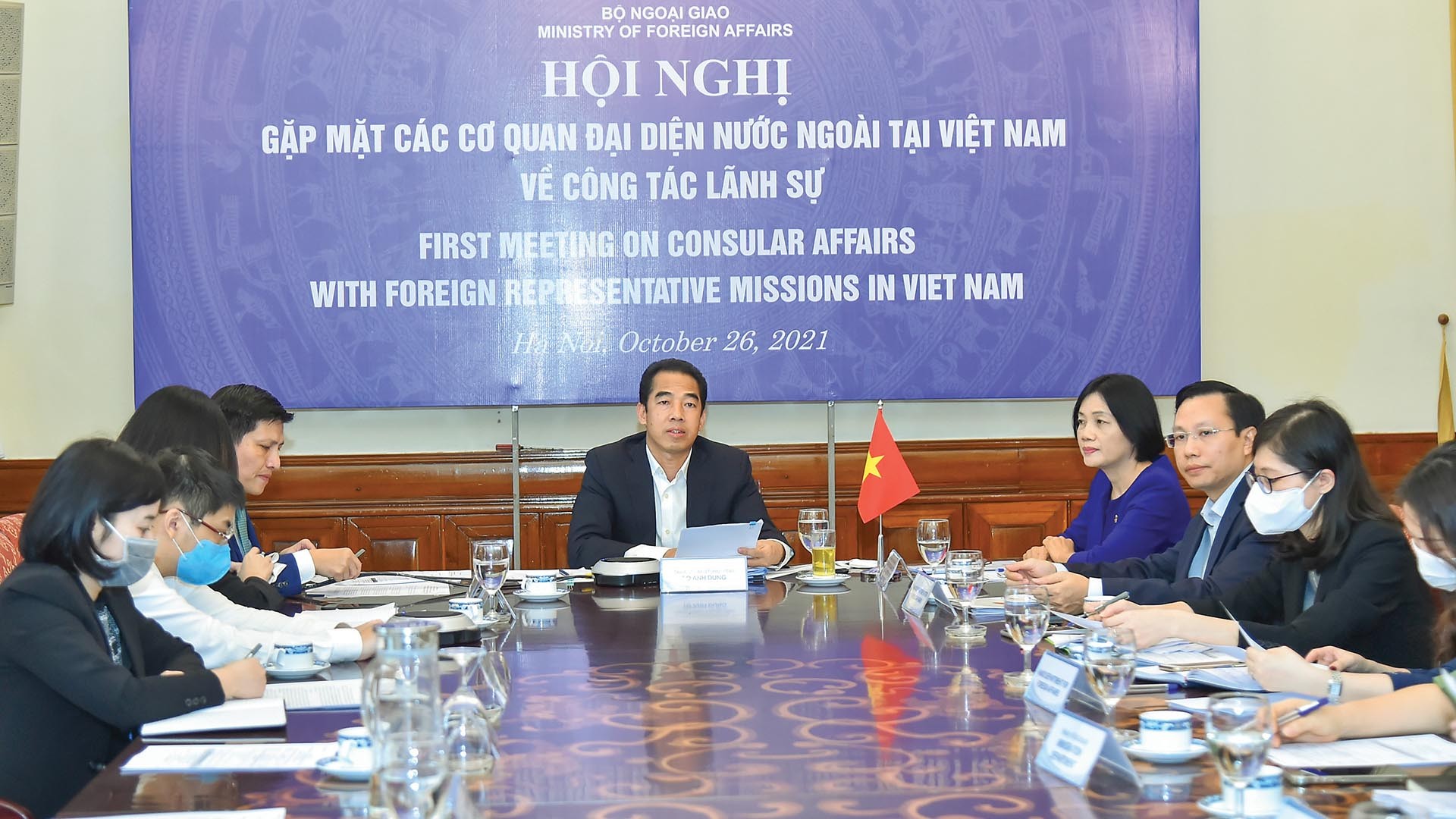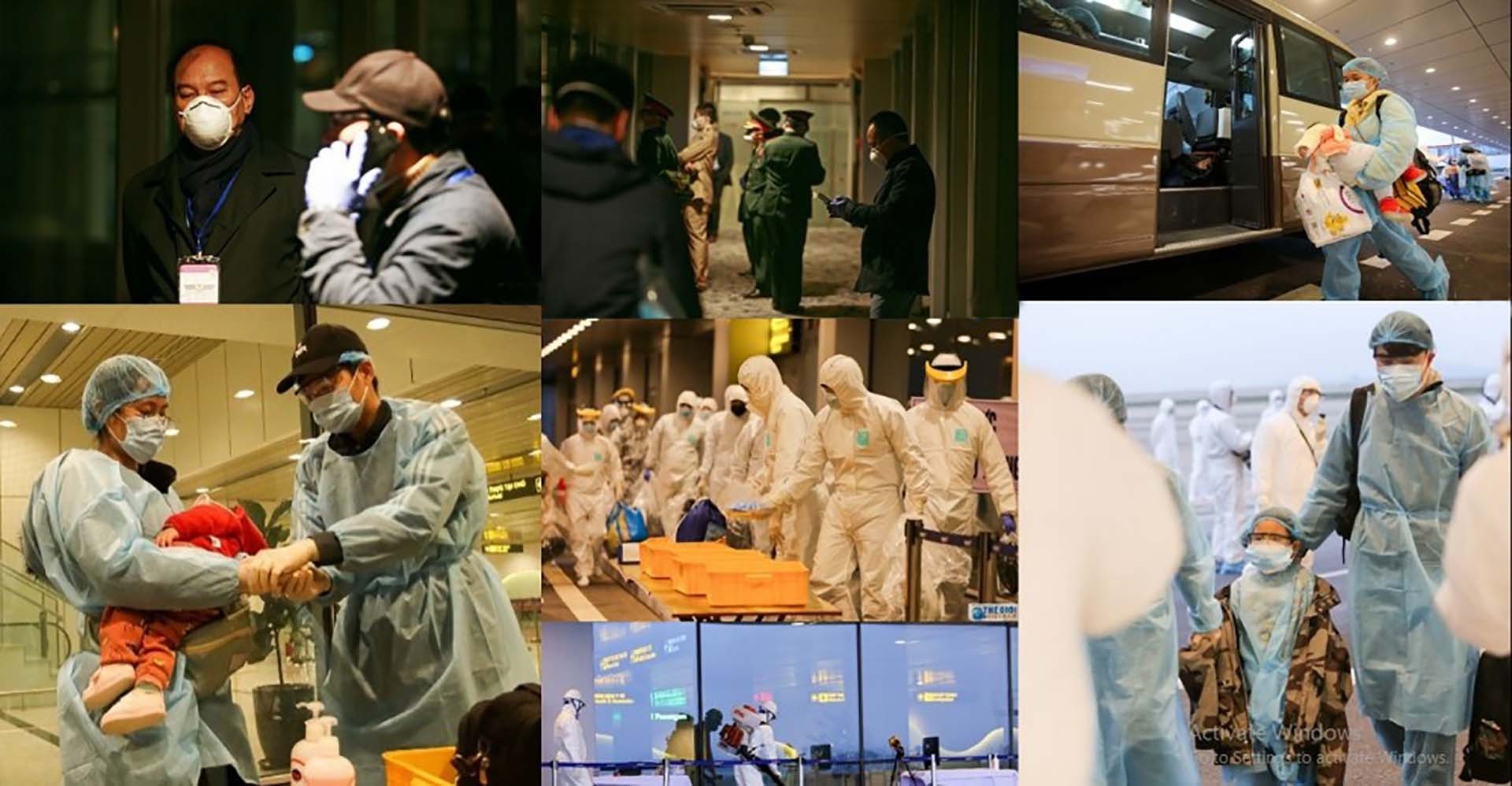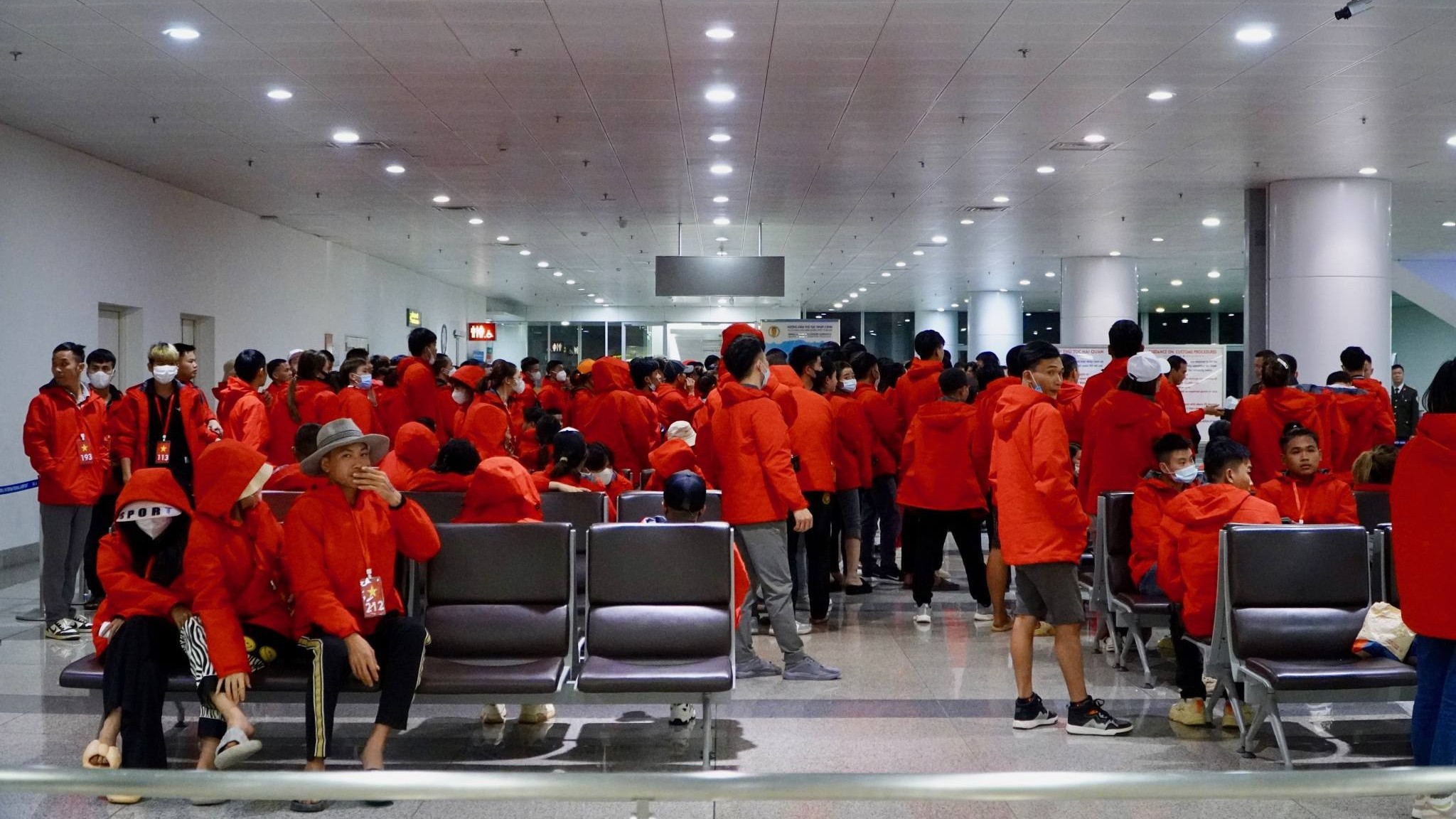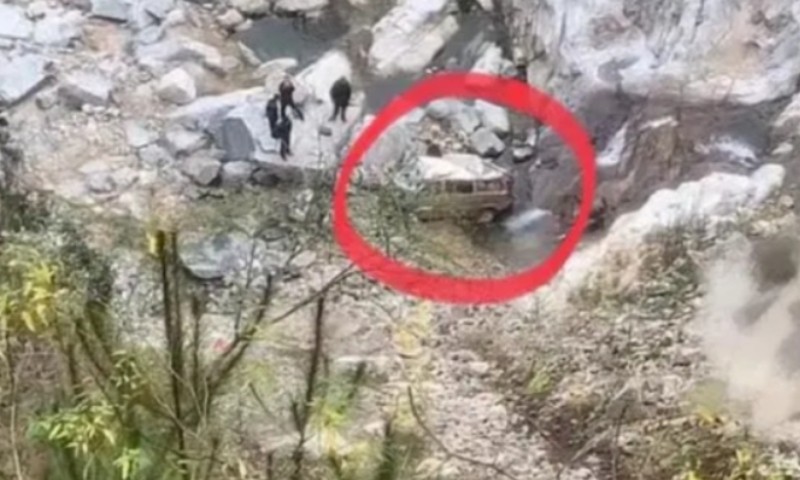
Continued implementation of vaccine passports and citizen protection work
Latest
 |
| Deputy Foreign Minister To Anh Dung chaired the first meeting on consular affairs with foreign representative missions in Viet Nam on October 26, 2021. (Photo: Tuấn Anh) |
Viet Nam has adjusted its strategy against COVID-19 in accordance with Resolution 128/NQ-CP on “Safe and flexible adaptation, and effective containment of COVID-19.” Mr. Deputy Minister, what are the most striking contributions of the Ministry of Foreign Affairs in the fight against COVID-19?
So far, the Ministry of Foreign Affairs has actively provided policy advice and recommendations for policy adjustment concerning entry and exit, the recognition and use of foreign vaccines passports in Viet Nam, the pilot operation of receiving tourists bearing vaccine passports, and the resumption of commercial flights with sufficiently safe countries and territories. These efforts have been made in accordance with the status of pandemic containment, the global trend of reopening, and the needs for socio-economic recovery and growth.
To fulfill the “dual goals” of both combating the pandemic and fostering economic development, the Five-Ministry task force (consisting of the Ministries of Health, Public Security, National Defense, Transport and Foreign Affairs, and led by the Ministry of Foreign Affairs) has accommodated the entry request of the foreign experts and nationals invited or guaranteed for entry into Viet Nam by central ministries and institutions, foreign diplomatic and diplomatic missions for official or business purposes.
Given the positive developments in the fight against the pandemic, in order to gradually reopen, recover and move towards a new normal, based on the reports by the Ministry of Foreign Affairs, on 29 October, the Office of the Government issued Document No. 7937/VPCP-QHQT. This Document communicated the instruction from Permanent Deputy Prime Minister Pham Binh Minh on granting permission for additional categories of entry seekers, in addition to the above-mentioned persons. These categories include foreign nationals and Vietnamese nationals who are foreign residents seeking entry for such purposes as conducting market research, visiting relatives, or traveling to pilot areas for tourist reception. Permanent Deputy Prime Minister Pham Binh Minh also gave instruction for further delegation of authority for the approval of specific entry requests, and proposed that quarantine at home applied to foreign experts and member of foreign representative missions in Viet Nam and their families would be shortened and that quarantine duration at centralized facilities would be reduced.
The adjustment of entry and exit policies as mentioned above aims to effectively translate the Government’s Resolution 128/NQ-CP into reality, in order to facilitate travel, foster socio-economic recovery and growth, and ensure pandemic safety.
To further improve the effectiveness of the vaccination strategy and achieve herd immunity, based on the recommendations of the Ministry of Foreign Affairs, the Prime Minister approved the guideline of vaccinating foreigners and overseas Vietnamese nationals who are currently residing in Viet Nam. Such efforts would be conducted regardless of nationality or residency.
The Ministry of Foreign Affairs has been working closely with other countries to gain access to more sources of vaccine and medical supplies, and expedite the transfer of COVID-19 vaccine and medication manufacturing technology.
In addition, the Ministry of Foreign Affairs will continue to cooperate with relevant authorities, such as the Ministry of Defense, the Ministry of Health, the Ministry of Transport, and overseas Vietnamese representative missions, to repatriate Vietnamese citizens.
Recently, a number of localities are implementing a pilot plan to receive international tourists bearing “vaccine passports.” What is your assessment on the implementation of vaccine passports and its outcomes?
At the outset, it is necessary to define “vaccine passport.” This term refers to certificates of full vaccination against COVID-19, or proof of recovery from COVID-19.
Based on international experience, this certificate is valid after 14 days since its holder was fully vaccinated, and would remain in effect for one year since the vaccination date. A proof of recovery would be valid for 6 months since its holder was confirmed to have recovered from COVID-19.
The Prime Minister has tasked the Ministry of Foreign Affairs with studying the mutual recognition of vaccine passports. Thus, the Ministry has identified this as the groundwork to put forth recommendations on policies to prioritize holders of recognized vaccine passports for entry, and allow them greater flexibility in terms of medical requirements, traveling, and participation in social activities. The mutual recognition of vaccine passports would pave the way for Viet Nam to re-open its borders.
As soon as the criteria on vaccine passports were approved by the Government, the Ministry of Foreign Affairs took the initiative in promptly sending out diplomatic notes to diplomatic missions and the EU delegation in Viet Nam to inform them of the new developments. These include Viet Nam’s criteria for recognition of foreign vaccine passports and readiness to commence talks for mutual recognition of vaccine passports on the basis of reciprocity.
Competent agencies are creating the database and finalizing Viet Nam’s official vaccine passport. For the time being, to realize the dual goals set by the Government’s leaders, the Ministry of Foreign Affairs has concurred with the Ministry of Health on the temporary recognition of other countries’ vaccine passports. This would allow for the vaccine passports in line with the formats officially provided via the diplomatic channel to be used directly in Viet Nam.
The temporary recognition of other countries’ vaccine passports is also an important condition for piloting the reception of international tourists in certain localities, such as Khanh Hoa, Phu Quoc, Quang Ninh and Quang Nam. It also helps advance the resumption of commercial flights with other countries.
The talks and recognition of vaccine passports with partners are going well, given that they all agree on the principle and significance of this matter. Some countries like the UK, the US, Australia, and Japan even affirm their recognition of Viet Nam’s current Vaccination Certificate issued by hospitals and vaccination facilities. They have requested Viet Nam to soon provide the sample of an official vaccine passport form for mutual recognition.
 |
| Citizen protection is a priority in Viet Nam's external policy. |
How will the consular work, including citizen protection work, be implemented in the new normal?
It can be affirmed that the Ministry of Foreign Affairs has identified citizen protection work as a crucial political task that requires constant and timely attention in recent time.
One of the highlights was the organization of repatriation flights for our citizens. Such flights have been conducted in a holistic and well-organized manner, meeting the needs of the people. Particularly, special attention has been paid to vulnerable groups, those in need and the deportees. Despite numerous difficulties caused by the COVID-19 pandemic, the Vietnamese overseas representative missions always stand ready and constantly carry out citizen protection work.
In the coming time, the COVID-19 pandemic is forecasted to continue witnessing uncertainties. However, the socio-economic recovery trend around the world will be accelerated, international travel and people-to-people exchange will become more robust, alongside underlying risks such as natural disasters, war and crimes. This will give rise to cases of our citizens being in distress with difficulties and obstacles, where the State’s protection and assistance are necessary.
To further uphold the successful implementation of citizen protection work, the Ministry of Foreign Affairs and diplomatic missions must continue to improve the effectiveness and readiness in undertaking citizen protection abroad. Among which, the following tasks must be effectively carried out:
First, it is necessary to thoroughly understand and effectively implement the tasks set forth in the documents of the 13th National Party Congress, which clearly stated the need for “improving the efficiency of citizen protection work”, where “all guidelines and policies must truly emerge from the legitimate aspirations, rights and interests of the people, with the people’s happiness and well-being as a goal to strive for”, and where “the people’s contentment and trust serve as criteria to evaluate the quality of the organizational apparatus and its staff.” Protecting the rights and interests of Vietnamese citizens and legal entities abroad also means protecting Viet Nam’s national interests.
Second, we need to promote research, and improve the quality of consultations for citizen protection policies. We need to increase the efficiency of consular work abroad, and overseas Vietnamese work, to meet the citizens’ needs regarding documents and procedures abroad, to help them attain a legal status and favorable opportunities to live, work and and integrate into the local community. We also need to maintain a close connection with overseas Vietnamese citizens.
Third, we need to expedite the implementation of the vaccine passport, and provide policy consultations to facilitate the ease of entry, exit and travel for Vietnamese citizens, contributing to the dual goals in the new normal.
In the time to come, the Ministry of Foreign Affairs and Vietnamese diplomatic missions abroad will continue to closely monitor the situation in the region and the world pertaining to citizen protection work, and cooperate with ministries, agencies and localities to effectively implement necessary protection measures when citizens encounter hardships overseas. In particular, as the COVID-19 pandemic continues to unfold in a complicated manner, diplomatic missions need to provide information in a timely manner so that domestic competent authorities may devise suitable pandemic control measures.
| Since 15 April 2020, Viet Nam has organized around 800 flights, repatriating nearly 200,000 citizens from over 60 countries and territories. |
By HAI YEN









